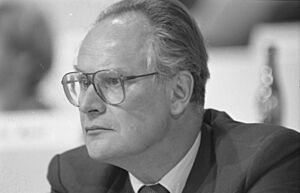Peter Glotz facts for kids
Quick facts for kids
Peter Glotz
|
|
|---|---|

Peter Glotz
|
|
| Member of the Bundestag | |
| In office 1972–1977 |
|
| In office 1983–1996 |
|
| Secretary of State of the Federal Minister for Education and Research | |
| In office 1974–1977 |
|
| Senator for Science and Research in the state of Berlin | |
| In office 1977–1981 |
|
| Secretary general of the SPD | |
| In office 1981–1987 |
|
| Personal details | |
| Born | 6 March 1939 Cheb, Czechoslovakia |
| Died | 25 August 2005 (aged 66) Zürich, Switzerland |
| Political party | SPD |
Peter Glotz (born March 6, 1939 – died August 25, 2005) was an important German politician. He was a member of the Social Democratic Party (SPD). Peter Glotz was also a social scientist, meaning he studied how society works.
Contents
Early Life and Education
Peter Glotz was born in Cheb, which was then part of Czechoslovakia. His father was German and his mother was Czech. After World War II, his family had to leave Czechoslovakia in 1945. They moved to Franconia, a region in Germany.
Glotz went to university to study many subjects. He studied Journalism, Philosophy, German language and literature, and Sociology. He attended the Ludwig Maximilian University of Munich and the University of Vienna. In 1968, he earned his doctorate degree in philosophy.
Political Career
Peter Glotz began his career in politics in the early 1970s. In 1970, he became a member of the Landtag of Bavaria, which is the state parliament for Bavaria.
Serving in the German Parliament
From 1972 to 1977, Glotz was a member of the Bundestag, the German parliament. During this time, he also served as a Secretary of State. He worked for the Federal Minister for Education and Research from 1974 to 1977. This role meant he helped lead important projects in education and science.
Senator for Science and Research
From 1977 to 1981, Peter Glotz took on another big role. He became a senator for science and research in the state of Berlin. A senator is like a minister in a state government. He was in charge of science and research policies for Berlin.
Secretary General of the SPD
Glotz returned to the German parliament in 1983 and stayed until 1996. From 1981 to 1987, he held a very important position within his party. He was the Secretary General of the SPD. This role is key for managing the party's daily operations and strategies.
Later Career and Contributions
After his time as Secretary General, Peter Glotz continued to contribute to society. He became the founding director of the University of Erfurt in 1996. He worked there until 1999. He also became a professor who taught about communication sciences.
From 2000 until his death in 2005, Glotz was a professor at the University of St. Gallen in Switzerland. He taught about media and society. In 2002, he was chosen to represent the German Chancellor at the Convention on the Future of Europe. This was a group that discussed the future of the European Union.
Peter Glotz also helped create the Centre Against Expulsions Foundation. He was a chairman of this foundation with Erika Steinbach. This organization works to remember and research the expulsions of Germans from Eastern Europe after World War II.
 | William L. Dawson |
 | W. E. B. Du Bois |
 | Harry Belafonte |

